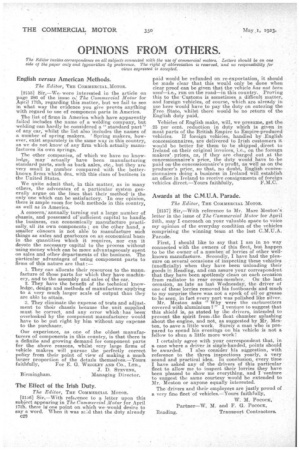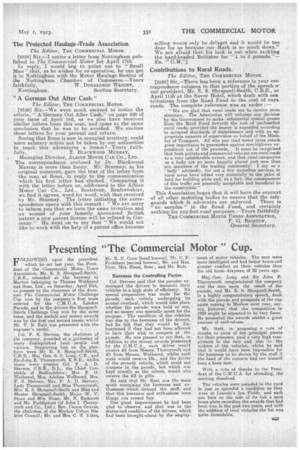OPINIONS FROM OTHERS.
Page 28

Page 29

If you've noticed an error in this article please click here to report it so we can fix it.
The Editor invites correspondence on all subjects conn.eeted with the u,se of commercial motors. Letters should be on one side of the paper only and typewritten by preference, The right of abbreviation is reserved, and no responsibility for views expressed is accepted.
English versus American Methods.
• The Editor, THE COmmEROME,MOTOR.
[21551 Sir,—Wee were interested in the article on page 286 of the issue o; The Commercial Motor for April 17th, regarding this matter, but we fail to see in what way the evidence you give proves anything with regard to use of component. parts in America.
The list of firms in America which have apparently failed includes the name of a welding company, but welding can hardly be considered a "standard part" of any car, whilst the list also includes the names of a number of spring makers. ' Spring i makers, however, exist separately in the same way n this country, as we do not know of any firm which actually manufactures its own springs.
The other companies, of which we have no knowledge, may actually have been manufacturing standard parts, such as back axles, etc., but they are very small in number compared with the betterknown firms Which deswith this class of business in the United States.
We qUite admit that, in this matter, as in many others, the advocates of a particular system generally argue on the lines that their method. is the only one which can be satisfactory. • In our opinion, there is ample room for both methods in this country, as well as in America.
A concern,' annually turning out a large number of chassis, and possessed of 'sufficient capital to handle the business, can economically manufacture practically all its own components ; on the other hand, a smaller ebneern is not able to manufacture such things as axles and gearboxes on an economical base: in the quantities which it requires, nor can it devote the necessary capital to the process without using money which can be more advantageously spent on sales and other departments of the business. The particular advantages of using component parts to firms of this nature are that :— 1. They can allocate their resources to the manufacture of those parts for which they have machinery, and to the assembly and sales of the car. 2. They have the benefit of the technical knowledge, design and methods of manufacture applying to a very much larger scale of output than they are able to attain.
3. They eliminate the expense of tests and adjust, rnent to their chassis because the unit supplied must be correct and any error which e has been: overlooked by the component manufacturer Would have to be nut right by him without any expense to the purchaser.
Our experience, as one of the oldest manufacturers of components in this country, is that there is a definite and growing demand for component parts for the above reasons, whilst very large firms of vehicle makers will pursue the perfectly correct policy from their point of view of making a much larger proportion of the details themselves.—Yours
faithfully, For E. G. WRIGLEY AND Co., LTD.,
J. D. STEVENS, Birmingham. Managing Director.
The Effect of the Irish Duty.
The Editor, THE COMMERCIAL MOTOR.
f2156] Sir,—With refeeenee to a letter upon this subject appearing in The Commercial Motor for April 17th. there ist one point on which we-would desire to say a word. When it was SE.;d that the duty already c28 paid would be refunded on re-exportation, it should be made clear that this would only be done when clear proof can be given that the vehicle leas not been used—Le, run on the road—in this country. Proving this to the -Customs is sometimes a difficult matter, and foreign vehicles, of course, which are already in use here would have to pay the duty on entering the Free State, -whilst there would he no return of the English duty paid.
Vehicles of English make, will, we presume, get the 25 per cent, reduction in duty which is given in most parts of the British Empire to Empire-produced
vehicles. If foreign vehicles, handled by ,English eoncessionnaires, are delivered to Irish customers it would be better foi them to be shipped, direct to Ireland on their original invoices, i.e., on the foreign makers' prices, as, if they are charged out at the concessionnaire's price, the duty would have to be paid on the concessionnaire'e profit, as well as on the producer's price, so that, no doubt, English comeseronnaires doing a business in Ireland will ,establish an office in Ireland to receive consignments of foreign vehicles direct.—Yours faithfully, Awards at the C.M.U.A. Parade.
The Editor, THE COMMERCIAL MOTOR.
[2157) Sir,—With reference to Mr. Mare Meston'S letter in the issue of The Commercial Motor for April 24th, may I encroach on your valuable space to voice my opinion of the everyday condition of the vehicles comprising the winning team at the last C.M.U.A. Parade.
First, I should like to say that I am in no way connected with the owners of this fleet, but happen to be the owner of a number, of lorries of other wellknown manufacture. Secondly, I have had the pleasure on several occasions of inspecting these vehicles (unofficially) when they have been unloading their goods in Reading, and can assure your correspondent that they have been spotlessly clean on each occasion from radiator to rear cross-member. On the last occasion, as late as last Wednesday, the driver of one of these lorries removed his footboards and much to my surprise there was not a speck of oilor grease to be seen, in fact every part was polished like silver. Mr. Meston asks "Why were the carburetters covered with aluminium?" I venture to suggest that this shield is, as stated by the drivers intended to prevent the spirit from the float chamber splashing about the engine, and not, as suggested by MT. Meston, to save a little work. Surely a man who is prepared to spend his evenings on 'his vehicle is not a fellow to shun a little more work
I certainly agree with your correspondent that, in a case where a driver is single-handed, points should be awarded. I also consider his suggestion, with reference to the three inspections yearly, a very sound and practical idea, In conclusion, every time I have asked any of the drivers of thia particular fleet to allow me to inspect their lorries they have been pleased to show me everything, and I venture to suggest the same courtesy would be extended to Mr. Meston or anyone equally interested.
The drivers and their employers are justly proud of a very fine fleet' of vehicles,—Yours faithfully, W. M. Poeoce, Partner—W. M. and F. G. Poeoex, Reading. Transeort Contractors.
The Projected Haulage-Trade Association.
The Editor, TuE COMMERCIAL MOTOR.
12158] notice a letter from Nottingham published in The Commercial Motor for April 17th.
In reply, I would beg to point out to "Small Man" that, as he wishes for co-operation, he can get it in Nottingham with the Motor Haulage Section of the Nottingham Chamber of Commerce.—Yours faithfully, W. DONALDSON WRIGHT, 'Nottingham. Section Secretary.
"A German Out After Cash."
The Editor, THE COMMERCIAL MOTOR.
[21601 Sir,—We were much amused to notice the article, "A German Out After Cash," on page 220 of your issue of April 3rd, as we also have received similar letters from this man, and came to the same conclusion that he was to be avoided. We enclose these letters for your perusal and return.
Seeing that Bonn is now in occupied territory, could some salutary action not be taken by our authorities to teach this adventurer a lesson ?—Yours faith fully, T. BLACKWOOD MURRAY, Managing Director, ALBION MOTOR CAR. CO., LTD.
The correspondence enclosed by Dr. Blackwood Murray is more than funny. Mr: Sturmey, in his original comment, gave the text of the letter from the man at Bonn, in reply to the communication which his first letter had elicited. Comparing it with the letter before us, addressed to the Albion Motor Car Co., Ltd., Scotatoun, Renfrewshirc, we find it agrees, word for word, with that received by Mr. Sturmey. The letter initiating the correspondence opens with this remark : " We are sorry to inf arm you that we have the same invention and an acount of your famerly ancounced British patent a new patent license will be refused in Germany." He went on to say that "We would not like to work with the help of a patent office because selling would only be delaget and it would be too dear for us because our Mark is so much down." We are afraid that his luck is out when tackling the hard-beaded Britisher for "1 to 2 pounds."— En. "
Contributions to Rural Roads. .
The Editor, THE COMMERCIAL MOTOR.
[2160] Sir,—There has been a reference in your cor
respondence columns to that portion of the speech re our president, Mr. E. S. Shrapnell-Smith, C.B.E., or April 11th at the Savoy Hotel, which dealt with con tributions from the Road Fund to the cost of rura roads. The complete reference was as under
We are glad that rural roads are to receive more attention. The Association will welcome any decision by the Government to make substantial annual grants from the Road Fund towards the cost of unclassified rural roads, provided the money is expended according to accepted standards of maintenance and with an appropriate measure of supervision on behalf of the Ministry of Transport. All who pay road motor taxes attach great importance to guarantees against non-highway expenditure out of the proceeds. It must be recognized that both private and commercial vehicles use rural roads to a very considerable extent, and that rural ratepayers as a body are no more happily placed just now than are members of the trading community. I say as a ' body ' advisedly, for not a few motorbus services in rural areas have added very materially to the price ot land for building plots and, as a fact, the consequences of this traffic are generally acceptable and beneficial to the countryside."
This Association hopes that it, will have the support of all other motoring bodies to ensure that the safeguards which it advocates are enforced. There is "no surplus " in the Road Fund, and certainly nothing for any but road purposes.—Yours faithfully THE COMM.ERCIAL MOTOR USERS ASSOCIATION, • F. G. BRISTOW, General Secretary.
































